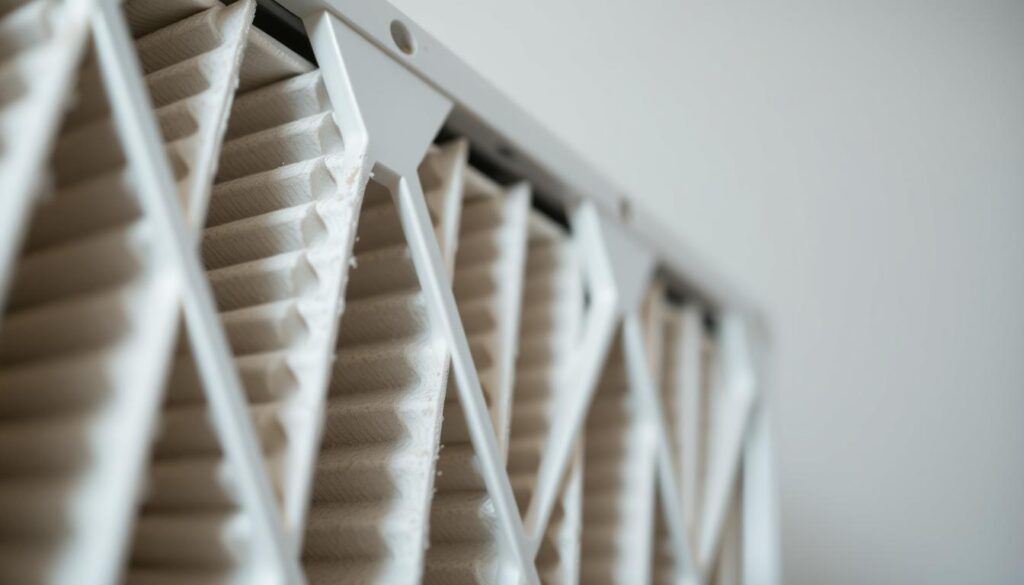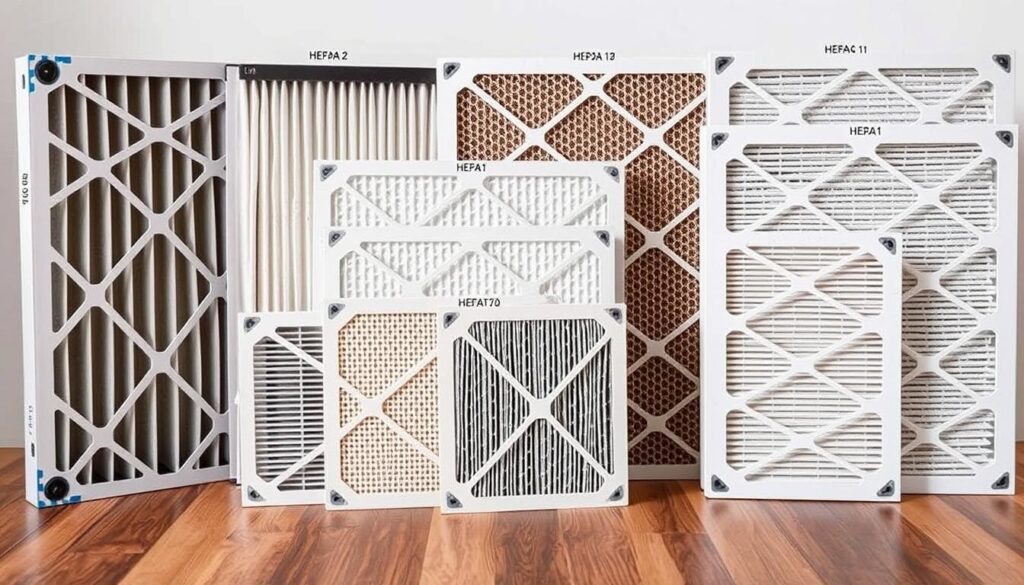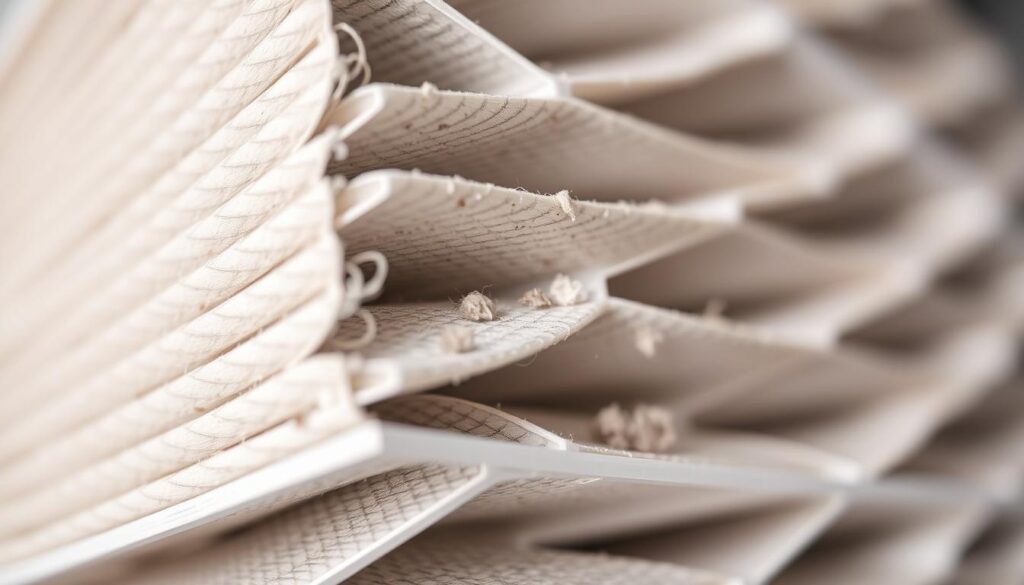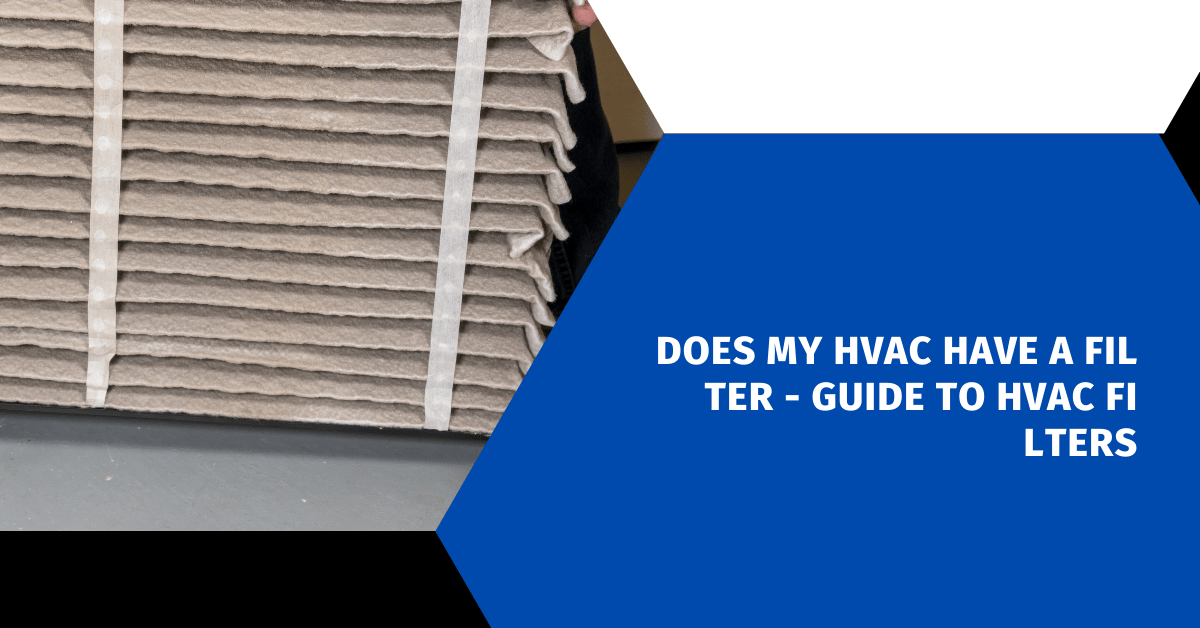Affiliate Disclosure
HVAC Guide Guys is a participant in the Amazon Services LLC Associates Program, an affiliate advertising program designed to provide a means for sites to earn advertising fees by advertising and linking to Amazon.
Does My HVAC Have a Filter? The United States Environmental Protection Agency (EPA) suggests checking your air filter monthly. They recommend changing it every three months. This simple step can greatly improve your indoor air quality and your HVAC system’s efficiency.
Your HVAC system is key to controlling your home’s climate. A good air filter is vital for it to work well. Whether you have an air conditioner, furnace, or a combined system, knowing about air filters and how to care for them is important. It helps you breathe better and can save you money on energy.

Key Takeaways:
- HVAC systems use air filters to remove particles, allergens, and pollutants from the air.
- Regularly changing air filters can improve indoor air quality and enhance HVAC efficiency.
- Different HVAC systems have specific locations for air filters, such as return air grilles, air handlers, or external filter racks.
- Selecting the right filter type and MERV rating for your home’s needs is crucial for performance and indoor air quality.
- Neglecting filter maintenance can lead to decreased HVAC system longevity and increased energy consumption.
Table of Contents
Understanding HVAC Air Filtration Basics
Your HVAC system is key to keeping your air clean. The air filters in it catch dust, pollen, and allergens. Knowing how these filters work helps you choose the right one for your home.
How Air Filters Work in HVAC Systems
HVAC air filters catch particles as air moves through your system. They are rated by MERV, which shows how well they filter. But, higher ratings might slow down airflow. So, finding the right balance is important.
The Importance of Air Filtration
Clean air is vital for your health and your HVAC system. Dirty filters can make your system work harder, costing more energy and risking damage. Regularly changing your filters keeps your system running smoothly.
Key Components of HVAC Filtration
An HVAC air filter has a few main parts. The filter material catches particles, and the pleats increase its surface area for better filtering. The frame holds everything together and seals the filter in place.
| HVAC Air Filter Type | MERV Rating | Filtration Efficiency | Typical Price Range |
|---|---|---|---|
| Fiberglass | MERV 4-8 | Traps larger particles | $6 – $25 |
| Pleated | MERV 8-13 | Traps smaller particles | $10 – $40 |
| Electrostatic | MERV 10-14 | Traps smaller particles and odors | $15 – $50 |
| HEPA | MERV 16-20 | Traps 99.97% of 0.3 micron particles | $50 – $120+ |
Learning about HVAC air filtration helps you pick the best filter for your system. This keeps your home’s air clean and healthy.
Explore Our HVAC Shop
Looking for top-rated HVAC tools, parts, and accessories? Visit our shop and find the perfect solution for your needs.
Visit the ShopDoes My HVAC Have a Filter – Common Filter Locations
Your HVAC system’s filter is key to keeping your air clean and your system running well. But where is it? You can usually find it in the return air grille, inside the air handler, or in a separate filter rack.
The air handler is often in the basement, attic, or garage. In horizontal units, filters are in a slot on the blower’s intake side. Vertical units have filters behind the return duct grille or in the base of the return duct.
Some systems have filters behind each return air grille. This ensures all areas of your home get filtered air. It’s crucial to check and replace your filters regularly to keep your system in top shape.
| HVAC Filter Location | Typical Placement |
|---|---|
| Return Air Grille | Behind the grille, often in the wall or ceiling |
| Air Handler |
|
| Filter Rack | Separate from the air handler, in the ductwork |
Finding your HVAC filter is the first step to keeping it in good condition. Changing filters every 3-6 months helps your system work efficiently and keeps your air clean.
Types of HVAC Air Filters Available
Choosing the right HVAC air filter is key to clean, healthy indoor air. There’s a wide range of filters, from basic to high-efficiency options. Each type meets different needs.
Fiberglass and Polyester Filters
Fiberglass and polyester filters are affordable. They catch dust and pet hair well. But, they don’t trap smaller irritants like pollen or bacteria as well.
Pleated and Media Filters
Pleated and media filters filter better than fiberglass ones. They have a higher MERV rating, catching smaller particles. They also have more surface area, trapping pollen, pet dander, and mold.
Washable and Reusable Options
Washable and reusable filters are a cost-effective choice. They can be cleaned and reused, saving money. Just make sure to dry them well to avoid mold.
Think about your home’s air quality, system size, and budget when picking a filter. Knowing the different types helps you choose the best one. This improves your indoor air and your system’s performance.
Explore Our HVAC Shop
Looking for top-rated HVAC tools, parts, and accessories? Visit our shop and find the perfect solution for your needs.
Visit the ShopAir Filter Sizes and Measurements
Finding the right air filter size is key for your HVAC system’s best performance. Air filter sizes are shown as “16x25x1” or “20x20x1”. These numbers mean the filter’s length, width, and thickness in inches.
Home improvement stores usually have air filters from 10 to 20 sizes. You’ll find popular ones like 20 x 20 x 1, 16 x 25 x 1, and 20 x 25 x 1. Actually, 70% of Filterbuy’s air filter sales are for non-standard sizes, showing a big need for custom-fit options.
It’s important to know the difference between nominal and actual sizes. Nominal sizes are rounded up, while actual sizes are exact. For example, a “20 x 20 x 1” filter might really be 19.75 x 19.75 x 0.75 inches. Knowing the exact size is key for a good fit in your HVAC system.
| Common HVAC Filter Sizes | Nominal Size | Actual Size |
|---|---|---|
| Standard Filter | 20 x 20 x 1 | 19.75 x 19.75 x 0.75 |
| Larger Filter | 20 x 25 x 1 | 19.75 x 24.75 x 0.75 |
| Thicker Filter | 20 x 20 x 4 | 19.75 x 19.75 x 3.75 |
If your HVAC system needs a non-standard filter size, don’t worry. Custom air filters can be made to fit perfectly. This is especially useful for older or unique HVAC systems that need special sizes.

Using the right HVAC filter is vital for your system’s efficiency and air quality. Always check the manufacturer’s advice and change your filters every 60 to 90 days. Or more often if you have pets or allergies.
Understanding Filter Rating Systems
Choosing the right air filter for your HVAC system is key for clean indoor air and system performance. It’s important to know about MERV, FPR, and MPR filter ratings. This knowledge helps you make a smart choice.
MERV Rating Explained
The Minimum Efficiency Reporting Value (MERV) is a standard for air filters, from 1 to 20. A higher MERV means better filtration of smaller particles. For homes, MERV 8 to 13 filters are best. They balance air flow and filtration well.
FPR and MPR Alternatives
Though MERV is common, Home Depot uses FPR and 3M uses MPR. These systems are similar to MERV. They help you pick the right filter for your needs.
Choosing the Right Rating for Your System
When picking a filter, think about your HVAC system’s needs. Check your owner’s manual or talk to a pro for the best MERV, FPR, or MPR. Higher-rated filters might filter better but could also slow down your system. The goal is to find a balance.
| Filter Rating System | Rating Scale | Particle Size Removal |
|---|---|---|
| MERV | 1-20 | MERV 8-13 for most residential systems |
| FPR | 4-10 | FPR 10 equivalent to MERV 20 |
| MPR | 300-2800 | MPR 2800 equivalent to MERV 14 |
Knowing about filter ratings and your HVAC system’s needs helps you choose wisely. This ensures your home has the best indoor air quality.
Explore Our HVAC Shop
Looking for top-rated HVAC tools, parts, and accessories? Visit our shop and find the perfect solution for your needs.
Visit the ShopThe Truth About High-Efficiency Filters
High-efficiency HVAC air filters sound great, especially HEPA filters. They can catch tiny particles like dust, pollen, and bacteria. But, they might not be the best for most homes.
HEPA filters work well in hospitals and clean rooms. But, they can be too tight for regular furnaces and air conditioners. This can cause problems like less airflow, more energy use, and damage to your HVAC.
For most homes, media air cleaners with MERV ratings between 13 and 16 are a better choice. They offer good efficiency without hurting your HVAC system too much.
“Filters with very high MERV ratings may lead to restricted airflow, which can cause HVAC systems to work harder, use more energy, and potentially reduce their lifespan.”
The MERV rating scale goes from 1 to 16, with higher numbers meaning better filtration. But, for most homes, filters with a MERV rating between 8 and 13 are best. They balance catching particles and keeping airflow good.
So, while HEPA filters are great for air quality, they might not be right for your home. Choosing a filter with a MERV rating in the right range can give you clean air without hurting your HVAC.

Filter Maintenance and Replacement Schedule
Keeping your HVAC filter clean is key for your system’s performance and air quality. Experts say to change HVAC filters monthly when it’s hot or cold. In spring and fall, change them every two to three months.
Signs Your Filter Needs Changing
There are clear signs your HVAC filter needs a swap. Look for dirt, higher energy bills, and less air from vents. Make sure you get the right size by writing the date on the new filter and taking a photo.
Seasonal Maintenance Tips
- Buy HVAC filters in bulk during sales to save money on future replacements.
- Add “change HVAC filter” to your seasonal home maintenance routine.
Good filter maintenance boosts your HVAC’s performance and cuts down on energy use. It also makes your air cleaner. By sticking to a regular change schedule and watching for filter problems, your home will stay comfy and energy-smart all year.
| Filter Usage | Recommended Replacement Frequency |
|---|---|
| Homes with pets | Every 60 days (2 months) |
| Homes with multiple pets, allergies, or respiratory conditions | Every 20-45 days |
| Vacation homes or vacant homes | Every 9-12 months |
| Homes with regular use | Every 90 days (3 months) |
“Regular air filter replacement is essential to ensure consistency and reduce unscheduled maintenance.”
Explore Our HVAC Shop
Looking for top-rated HVAC tools, parts, and accessories? Visit our shop and find the perfect solution for your needs.
Visit the ShopImpact of Dirty Filters on HVAC Performance
Keeping your HVAC system clean is key for energy savings, comfort, and air quality. But, many overlook the air filter’s role. A dirty air filter can hurt your system’s efficiency and energy use.
A clogged air filter can raise energy use by 5-15%, says the U.S. Department of Energy. This is because a dirty filter limits airflow. Your HVAC system then works harder, raising your bills and wearing down parts faster.
Dirty air filters are the top reason for HVAC failures. They can cause early mechanical problems, leading to expensive repairs or new system costs. But, clean filters prevent damage and extend your HVAC’s life.
Dirty filters also harm your home’s air quality. They let dust, debris, and allergens back into the air. This can make breathing harder for people inside.
To keep your HVAC in top shape, change your air filters often. Follow the maker’s advice. This easy step helps save energy, keeps your system running, and makes your air cleaner and healthier.
| Impact of Dirty Filters | Consequence |
|---|---|
| Increased Energy Consumption | 5-15% increase in energy usage |
| Accelerated Wear and Tear | Leading cause of HVAC system failure |
| Reduced Indoor Air Quality | Recirculation of contaminants and allergens |
Regular air filter care is a simple way to keep your HVAC efficient, long-lasting, and healthy. Don’t let dirty filters harm your system’s performance and energy use.
Cost Considerations and Filter Investment
Keeping your HVAC system in top shape is key, and air filter costs play a big role. Prices for filters range from $6 for basic ones to over $120 for top-notch HEPA filters. Even though better filters cost more upfront, their long-term benefits are worth it.
Price Ranges for Different Filter Types
Here’s what you can expect to pay for different types of filters:
- Fiberglass and polyester filters: $6 – $25
- Pleated filters: $10 – $40
- Electrostatic filters: $15 – $50
- HEPA filters: $50 – $120+
Long-term Cost Benefits
While better filters cost more at first, they save you money in the long run. They make your HVAC system work better and use less energy. Replacing filters regularly is cheaper than fixing or replacing your HVAC system too soon.
| Filter Type | Average Lifespan | Estimated Annual Cost | Potential Energy Savings |
|---|---|---|---|
| Fiberglass | 1-3 months | $24 – $100 | 5-10% energy savings |
| Pleated | 3-6 months | $40 – $80 | 10-15% energy savings |
| Electrostatic | 6-12 months | $30 – $50 | 15-20% energy savings |
| HEPA | 12 months | $50 – $120 | 20-25% energy savings |
Choosing better HVAC filters leads to long-term energy savings and a good return on your filter investment.
Common Filter Installation Mistakes to Avoid
Keeping your HVAC system running well is key. Proper HVAC filter installation is essential. Many homeowners make mistakes that hurt their air filtration. Knowing these errors helps your HVAC system work better and keep your air clean.
One big mistake is using the wrong HVAC filter size. Filters that are too small leave filter gaps and let unfiltered air in. This reduces how well your filter works and can harm your HVAC. Always measure your filter opening right and pick the correct size for a good fit.
Another mistake is putting the filter backwards. This ignores the airflow direction arrows. It messes up the airflow, making your filter less effective and straining your system.
- Always make sure the filter is installed with the airflow direction arrows pointing the right way, as the manufacturer says.
- If you’re not sure how to install it, check your HVAC manual or ask a professional.
Not changing filters often is another big mistake. You should replace them every one to three months. Dirty filters block airflow, lower system efficiency, and can cause system failure.
Avoiding these HVAC filter installation mistakes helps your HVAC system last longer. It keeps your indoor air quality good and lets you enjoy your home’s comfort.
Explore Our HVAC Shop
Looking for top-rated HVAC tools, parts, and accessories? Visit our shop and find the perfect solution for your needs.
Visit the ShopConclusion
Choosing the right HVAC filter is key for better system performance and cleaner air. Knowing about different filters and their sizes helps you pick the best one for your home. This ensures your home stays comfortable and your air quality improves.
Changing your filters regularly, every 1-3 months, is crucial. It helps your HVAC system last longer and keeps your home cozy. Even though high-efficiency filters clean the air better, they might not fit all systems. Always talk to HVAC experts to find the right filter for your system and air needs.
Getting a maintenance plan for your HVAC can save you money over time. It includes regular filter changes and cleanings. This keeps your system running smoothly and efficiently. By focusing on HVAC filter care, you make your home healthier and more energy-efficient.

